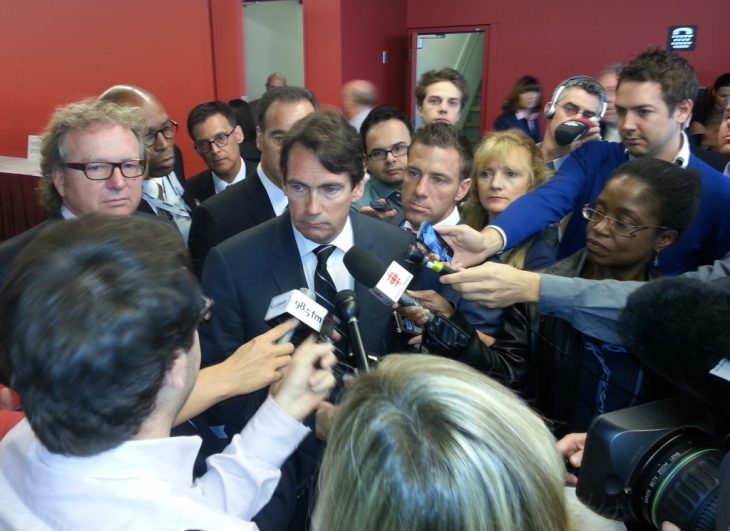
MONTREAL – There’s little doubt of who’s the biggest fish in the Quebec media pond. Quebecor CEO Pierre Karl Peladeau is a rock star here, drawing reporters, photographers and others like kids to free candy floss.
We’re hard pressed to think of an executive in English Canadian media whose mere arrival at a CRTC hearing would be akin to a red carpet walk, as the assemblage of shooters blasted away when Péladeau walked in with Group TVA president Pierre Dion and Vidéotron president Robert Dépatie. After their appearance a the hearing, more than a dozen microphones and numerous still and video cameras faced Péladeau when he scrummed the press (see our photo below).
During the hearing, the CEO, whose vertically integrated company is far and away the largest media business in French Canada, said the Bell purchase of Astral is one big step too far when it comes to vertical integration in Canada. He acknowledged his company and others have led the way on VI (Quebecor, like Rogers, owns broadcasting, cable, broadband, print and wireless divisions), but said this acquisition must be stopped as Bell will just become too formidable.
“This impact of this type of domination would suffocate in the long term any form of competition,” Péladeau said in French during his presentation to the Regulator. “No other Canadian company would be able to compete with the power of Bell.” (Ed note: Most of the quotes in this story were made in French and we took notes from the CRTC translator.)
So, no new rules, no amount of safeguards built around Bell will help, he added. “History has proved… whatever conditions you impose on them, they will get around them… there’s no limits on the arrogance of Bell’s leaders,” said the Quebecor CEO.
Péladeau pointed to the difficulty his company had in trying to launch a pay TV movie channel which caused competitive hassles that would just get worse if Bell is allowed to own Astral. When QMI attempted to get a license for Ciné-TVA (a license application which was turned down by the CRTC in 2010), Astral immediately went to most of its studio partners and locked up content in even longer term deals than it already had, leaving little room for the new movie channel. “Astral really blocked the market,” he said.

CRTC chair Jean-Pierre Blais, however, noted that such moves can certainly be expected in a competitive market when conditions change, or look like they will change. “Isn’t this the nature of the beast in a competitive market?” he asked. “Wouldn’t you do the same thing if you had been in their shoes?”
Many suggest, of course, that Quebecor just wants to stop Bell from buying Astral because it likes the Quebec market as it is and doesn’t want Bell as a bigger competitor in the French TV market. Péladeau disputed that. “We have been bringing competition all over the place, in telecommunications and broadcasting, we launch new services, telecommunications services, we launched wireless services in Quebec… We’re not afraid of them. In fact, we are always welcoming (competition),” he told reporters in English after his appearance.
Two of Quebecor’s primary worries are that although it will continue to lead in audience share with TVA even after a purchase of Astral by Bell, the newly combined company will own 75% of the French-language specialty channels, something Péladeau characterized as “a monstrous level of dominance.”
The other major concern Quebecor expressed is that Bell-Astral will be such a huge force in the national advertising market that it will be able to treat Quebec viewers as a throw-in on ad deals, selling their ad time in the market at a big discount when national or international brands are buying advertising time. Since Quebecor is almost solely reliant on Quebec for its very existence, and on advertising for most of its broadcast division revenue, this is a scary thing, said Dion. Quebecor owns just a few specialty channels which account for very little of the company’s overall income.
“Should this transaction be accepted, the Quebec market will really become a bonus market at the advertising level,” he explained. “There will be out and out dumping in the Quebec market, sold as a bonus… I am convinced of this.” Advertising decisions are often made in New York, Chicago or Toronto, Dion continued, by ad clients wanting to keep their costs as low as possible and taking whatever national deals they can from Bell, making it hard for Quebecor to match those rates just in their market. “This company can not play the bonus game, the markdown game,” said Dion.
After the hearing, Péladeau faced the throng of reporters to re-hammer his points (some industry observers Tuesday told Cartt.ca they thought the CEO hammered just a bit too hard during his time in front of the commissioners).
“When you look at the footprint, not only in terms of market, but in services, this is something that does not exist anywhere but in Canada if this transaction was to be approved,” he told reporters. And if the deal is allowed? “We are going to create a monopoly marketplace based on a mindset that is going to be bad for consumers and bad for all Canadian citizens.
“You need to look at this as a combination… For the first time ever, you are going to see a dominant position from the Anglophone market and the Francophone market across Canada in specialty channels and conventional channels, in telecommunication and in broadcasting,” he said. “This is unique compared to every other western country.”
But what if the deal is denied, would Quebecor then be interested in trying to purchase Astral? Said Péladeau: “We didn’t have any interest in buying Astral.”
The hearing resumes Wednesday with the likes of Cogeco, Rogers and Telus on the schedule (a schedule that has been a little fluid over the first two days).


